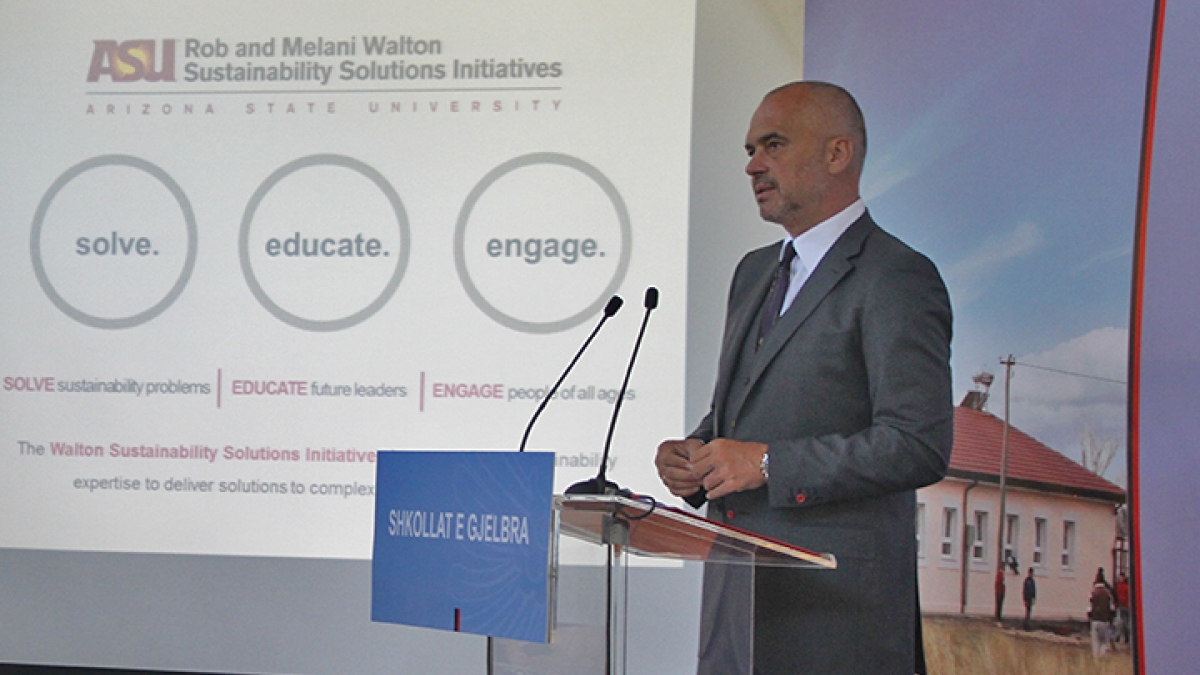ASU report outlines green schools plan for Albania

Albanian Prime Minister Edi Rama speaks at a special conference announcing ASU's study to transform Albania's 3,300 schools through a series of innovative, sustainable repairs and improvements.
Photo by: Michael Dalrymple
Going to school in Albania means dealing with frequent power outages; the electricity grid is only 60 percent reliable, and schools have limited access to even that. Albania wants to make its schools safe, stable and energy efficient, and the nation turned to ASU’s sustainability experts for help.
The result: a step-by-step plan to transform the schools and boost that nation’s economy.
An Arizona State University study outlining that plan determined that Albania's education system could be transformed through a series of innovative, sustainable repairs and improvements to its 3,300 schools. The study was presented on June 4 by ASU sustainability scientists at an event in the capital, Tirana.
Albanian Prime Minister Edi Rama and Minister of Education and Sports Lindita Nikolla were in attendance. Rama stressed the importance of sustainability initiatives for the future of his country.
"We want to guarantee that no investment in the construction of schools will be allowed without green and energy-efficiency standards," Rama said.
ASU’s Global Sustainability Solutions Services, a program within the Walton Sustainability Solutions Initiatives, evaluated the opportunities, challenges, impacts and costs for “greening” Albania’s school buildings and developed a multi-tier approach to improving energy efficiency, air quality, indoor/outdoor facilities and other design elements.
The recommended upgrades, which would require international and national investment and support, could generate more than 220,000 new jobs and increase Albania’s gross domestic product by $880 million.
The yearlong evaluation of the nation’s school facilities included comprehensive in-person site visits by a team of ASU Sustainability Scientists and Scholars who determined that the schools’ physical condition and fluctuating energy access was affecting student health, comfort and performance.
Currently, Albania’s schools – particularly those in rural areas – suffer frequent power outages.
“The Ministry of Education and Sports is committed to providing students with safe, positive learning environments," said Deputy Minister of Education Arbjan Mazniku. "ASU’s Green Energy-Efficient Schools for Albania report will serve as the cornerstone to our efforts to bring Albanian students the practical knowledge they require to contribute to local and global sustainability.”
ASU developed four intervention options based on the site visits and government resources to transform energy efficiency and education in Albania’s schools. Each tier builds on the next, beginning with basic repairs to existing systems and mold elimination, progressing to passive energy techniques, then adding LED lighting and solar energy and, lastly, expanding to specialized instructional spaces equipped with sustainable learning tools.
“Albania’s desire to implement a national sustainability plan beginning with its schools demonstrates the country’s commitment to the development of a new generation of students, teachers, designers and economic stakeholders who are invested in sustainability,” said Gary Dirks, director of the Julie Ann Wrigley Global Institute of Sustainability at ASU. “We hope that this study can become the foundation of a broader partnership with Albania that will position them as a regional leader in the green schools movement.”
The report, authored by ASU Senior Sustainabiility Scientist and Walton Global Services practice lead Mick Dalrymple, recommends that Albania implement improvements through at least the second tier. The greatest economic and student health benefits are projected to come after implementation of all four tiers with an approximate investment of $2,150 per student.
The study was funded by the Open Society Foundation for Albania, who looked to ASU's sustainability experts to help the country bolster its education system as part of the organization’s mission to strengthen citizen participation and transparent governance.